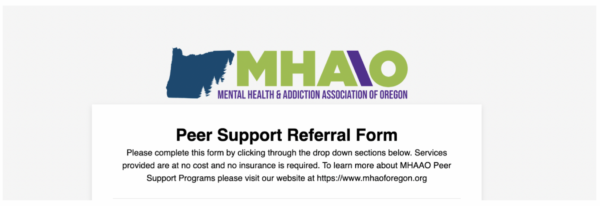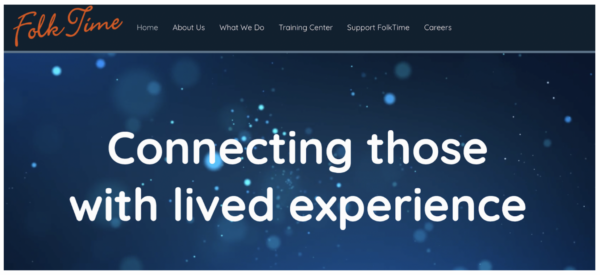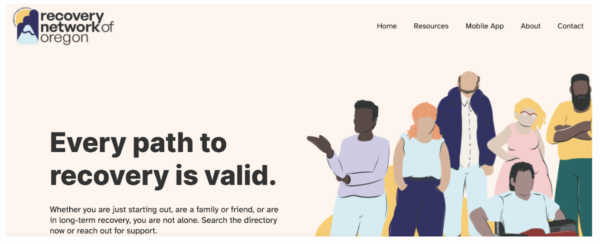Addiction is isolating. And when your life has come to revolve around addiction, recovery can be isolating, too.
Evidence-based addiction treatment can help you get the medical care and person-first treatment plan you need to get your life back on track, but tackling that feeling of “being alone” or being “the odd one out” can be a major stumbling block for patients in early recovery. Embracing a recovery lifestyle often means allowing some of our most important relationships to end if those relationships don’t support our new ways of moving in the world. Breaking free from addiction is not a story we often see reflected in popular media and those who are thriving in recovery often don’t broadcast their recovery status far and wide.
The result? Too often, it’s loneliness and isolation.
What is peer support? What are peer recovery specialists or peer support specialists?
Peer support is an old concept. It is a non-clinical relationship between a person with lived experience in mental health, behavioral health, or both. In Oregon, some peer support workers are certified, others aren’t. While peer support workers can’t administer treatment plans, or prescribe medication, or monitor healthcare details, they have a vital role to play in promoting success and wellness in recovery. Peer support workers can bust myths surrounding addiction and recovery, inspire hope and a sense of possibility for people in recovery, provide education, tools, and resources for peers, and help people in early recovery define their life goals and make a plan to achieve them.
Does Medicaid cover peer support services in Oregon?
Yes. OHP, Oregon’s Medicaid program, does cover peer support services. This coverage has been going strong in Oregon since 2007, when the national Medicaid organization, called CMS, approved coverage for peer support services nationally.
There are also programs that provide peer support services for free for people without insurance of any kind, including people without access to Medicaid.
For more on OHP, Medicaid and addiction treatment in Oregon, see: Does Oregon Health Plan AKA OHP Cover Addiction Treatment in Portland Oregon?
Where can I access peer support services in Portland? What organizations in Oregon provide referrals for peer support specialists?
Here’s a list and detailed description of the main organizations in Oregon that provide peer support services:
MHAAO (Mental Health and Addiction Association of Oregon)
Mental Health and Addiction Association of Oregon has a free referral service. The services they refer to are free of cost and do not require any type of insurance coverage. You can fill out their referral form here.
4D Recovery
4D Recovery is a Portland-area recovery community powerhouse for young people in recovery in the metro area. We love this resource for all of our patients under 35. In past years, 4D only served young adults in their 20’s, but now there is programming there for young-ish adults half-way through their 30’s. This is great to see. You can sign up to receive free, Certified Recovery Mentorship with 4D here. For more on 4D from this blog, you can check out our post on our 4 favorite addiction recovery support groups in Portland, Oregon.
FolkTime
FolkTime runs one of the longest-running peer support services in the Portland metro area. Originally a project coming out of the Presbyterian church, FolkTime now delivers non-clinical peer support services and runs support groups for people in recovery in Portland and Oregon City. The run weekly Peer Connection Centers in both locations, and host outings for the community, as well. They have plans to open a Peer Respite Center, a homelike environment for people in crisis, in the Portland Metro area soon.
Peer Galaxy
Peer Galaxy is an amazing resource for people looking for an encyclopedia of peer support services and peer-to-peer support groups, hotlines, meetups, and more in the state of Oregon. Their calendar function is so comprehensive that it tends to be slightly overwhelming, but the options narrow down quickly if you filter the results for topic, location, and type of resource. You’ll find a lot of resources targeted for specific populations on this site: recovery groups for moms, crisis hotlines for transgender youth, warmlines to connect LGBTQ+ young adults with LGBTQ+ elders for advice and intergenerational camaraderie. For more on addiction treatment services and resources for the LGBTQ+ community, see our blog post on our favorite LGBTQ+ addiction treatment and recovery services in Portland.
Recovery Network of Oregon
Recovery Network of Oregon is a directory of resources for people in recovery put together by the folks at Oregon Recovers. You can filter results by county, insurance coverage, and population (categories include: race, gender, pregnancy status, occupation, veteran status, etc). Recovery Network of Oregon is perhaps a bit more user-friendly than Peer Galaxy, with a user interface that is easier to read and more straightforward to navigate.
NAMI Oregon
The National Association of Mental Illness chapter in Oregon also makes free referrals for peer support. This resource is particularly useful for patients who are dealing with a dual diagnosis – those who are struggling with Substance Use Disorder as well as a mental health condition, like depression, anxiety, or bipolar disorder. The truth is that many, if not most, SUD patients are dual diagnosis patients, so NAMI is particularly relevant for many patients at Shanti Recovery and Wellness. NAMI can connect you with peer support services that are tailored to your mental and behavioral health recovery journey. For more on dual diagnosis, check out our blog post on the link between depression, anxiety, and addiction.
Portland residents tend to gravitate towards our programs because we offer a warm, family-style environment with knowledgeable clinicians in a comfortable setting.
Our building is a converted craftsman that looks and feels more like a chiropractor’s office or a naturopathic family medicine clinic than it does an addiction treatment center. We tailor our patient-centered treatment plans around your preferences and goals, taking the whole patient into consideration, rather than treating addiction in isolation.
Plus, we’ve recently added TMS – Transcranial Magnetic Stimulation – and Ketamine therapy to our existing patient services. We’re also pleased to announce that we now offer psychiatric services for Pediatric and Adolescent patients, as well.
Interested to learn more about how we can help? Give us a call today to begin your journey to freedom from addiction!





